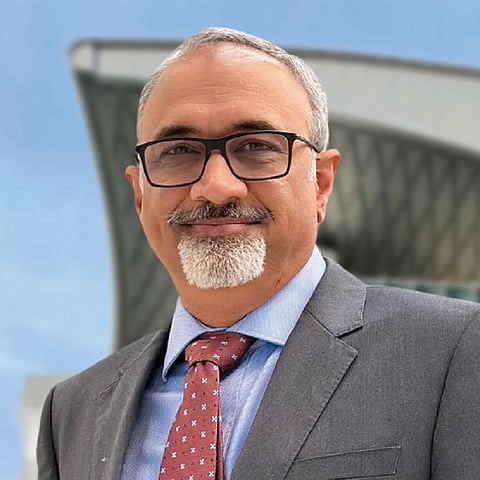
- HEADLINES
- NEWS
- PAGE THREE
- COMMENTARY
- BUSINESS
- LIFE
- ACTION
- GLOBAL GOALS
- SNAPS
- DYARYO TIRADA
- AIF
- MORE

The government and private sector need to collaboratively launch a nationwide effort to push for the adoption of science-backed artificial intelligence or AI to help communities and businesses keep up with the rapid technological advancement.
In an interview with reporters last Friday, Dr. Sanjay Sarma, CEO, president, and dean of the Asia School of Business or ASB, reiterated that AI is developing at an unprecedented pace and will be everywhere soon.
"AI can potentially replace jobs so let's accept that. The Philippines should become the country that leads the world in how to use AI, in call centers, for instance," Sarma told reporters.
"Here in the Philippines, it has to be a national effort. The government needs to be cognizant that this is an epic moment. It's like, you know, climate change is going to damage the environment, it will hurt a lot of people. This is technology change is just like climate change," he said.
Unlike other technologies such as automated teller machines or ATMs, which took about 15 years to be widely accepted, AI is a development that needs urgent adoption.
Like ATMs, which previously raised concerns about replacing the job of bank tellers, AI will help industries develop further.
"Bank tellers did not lose their jobs. Bank tellers did something more advanced, which is selling mortgages and things like that. The job changed because of technology," he explained.
Thus, in blending in with the changes brought about by AI, Sarma proposed that local industries like the business process outsourcing sector should upgrade more into becoming a technology space.
"At this level, you have to go up because the attack comes from below. It's like a tiger, you know, it's chasing you, You climb a tree, and the tiger learns to climb the first 10 feet, well, you have to climb higher. So you have to go higher up in the cognitive stock to go higher," he said.
To complement the benefits of AI, Sarma noted that the local service industry workers, for instance, have to do the things that technology cannot.
"For example, this Chat GPT cannot negotiate with you, can't do any planning, can't do dispute resolution. It can't calm an angry customer. So you have to figure out what the technology can do and what humans can do, that the technology can't. And you're to develop human capital in those directions."
Sarma is a professor of mechanical engineering and the Sloan School of Management at the Massachusetts Institute of Technology. He is a leading authority in AI, the Internet of Things, and Education.
ASB, established in 2015 by Bank Negara Malaysia in collaboration with MIT Sloan School of Management, aims to be a premier business school that develops transformative and principled leaders who will contribute to the advancement of the emerging world, particularly in Asia.
Last July, Surigao del Norte Rep. Robert Ace Barbers asked the Congress and Palace to consider creating an agency that will oversee responsible AI use in the country.
Barbers cited that at least 520,000 employees across different industries may be affected by the integration of AI.
In March, he filed a bill eyeing to create the Artificial Intelligence Development Authority, which will serve as an AI monitoring body tasked to supervise the "development and deployment of AI technologies."
Primarily, it will ensure compliance with AI ethics principles and guidelines and protect the "rights and welfare of individuals and communities affected by AI technologies."
